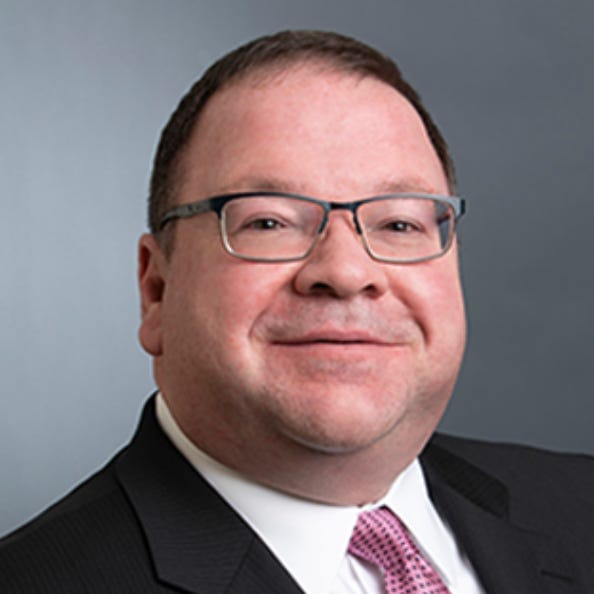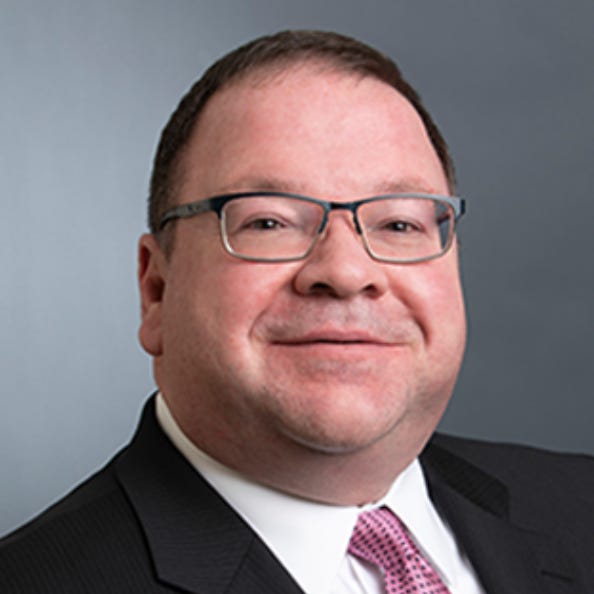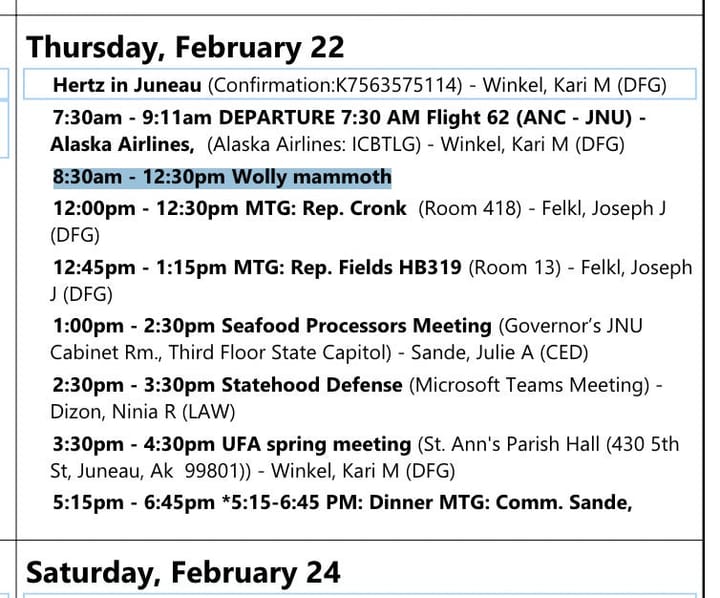Interesting stuff: Alaska tribal health groups battle over documents in court; Clarkson and Kelly return to politics
Plus: More details about the removal of a university researcher from a state electricity task force, which came after she "disappointed" the head of the Alaska Energy Authority.

This edition of Northern Journal is sponsored by The Boardroom, a shared workspace in Anchorage. I use their array of comfy and light-filled spaces as an alternative to my home office, and I also enjoy the free kombucha and convenient access to downtown. Check out membership options here.
Interesting Stuff is back this week with news about a court fight between tribal health organizations, the removal of a university researcher from a state energy security task force, and the return to the political arena of former Alaska Attorney General Kevin Clarkson and former Senate President Pete Kelly.
I’m working on other stories including the proposed rate increase by Anchorage’s electric utility, Chugach Electric Association, as well as some longer-term projects. If you have tips or feedback, please contact me.
A reminder: This newsletter is wholly supported by readers, and your voluntary memberships are my only source of income to cover my costs, like the per-page payments for the court documents that form the basis for some of the material below. If you can afford to, please consider subscribing.
Also: I’m in search of an attorney who can represent me in periodic disputes with state agencies over public access to documents. If you have any recommendations, please let me know.
Top energy official’s “disappointment” preceded researcher’s removal from electricity task force
Alaska’s top energy official, Alaska Energy Authority Executive Director Curtis Thayer, complained about opinion pieces written by his co-leader on a state energy task force two days before GOP Gov. Mike Dunleavy removed the co-leader from the panel, according to newly released email correspondence.

Thayer, the head of the Alaska Energy Authority, wrote June 7 to university researcher Gwen Holdmann saying he was “disappointed” she’d written a series of energy-focused opinion pieces without “sharing” them in advance, adding that the essays were “causing trust issues” with other members of Dunleavy’s newly-formed Energy Security Task Force.
Thayer and Holdmann, the founding director of the Alaska Center for Energy and Power, were the original vice chairs of the task force, which Dunleavy has charged with reducing the cost of electricity in the state.
Two days after Thayer emailed Holdmann — following email correspondence between Thayer and gubernatorial aides — Holdmann said she was notified that Dunleavy had removed her from the panel. She’s since been replaced by another official from the University of Alaska system.
Holdmann, in a phone interview this week, reiterated that she is still assisting the task force but said she has not been given an explanation for her removal.

It’s likely, she added, that the action was related to her opinion pieces, in which she explored different options for modernizing Alaska’s electrical grid without directly endorsing specific options. But, she added, she thinks there may be additional reasons Dunleavy removed her.
“There's probably some dynamic that I'm not really aware of,” she said.
Holdmann is known for her research into the potential of nuclear microreactors in Alaska, while Thayer, in his position at the energy authority, has worked closely with the state’s urban utilities, which are deeply dependent on natural gas.
The newly released email correspondence was contained in a response to a public records request by Northern Journal to the Alaska Energy Authority.
All the messages that appeared to directly relate to Holdmann’s removal were heavily redacted or withheld entirely, including some of their subject lines. Many of the redactions were made on the basis of a “deliberative process” privilege that allows the executive branch to withhold records when disclosure would “deter the open exchange of opinions and recommendations between governmental officials."
The redacted messages included Thayer’s complaint to Holdmann; she released an unredacted copy.
Thayer declined to be interviewed, but said in a text message that he was “not the decisionmaker in the process” of Holdmann’s removal.
“Gwen is still involved in the task force and will be presenting at the next meeting,” Thayer said.
Tribal health organizations spar over documents in federal court
As Alaska’s Native hospital works to fix governance problems that have put its federal funding at risk, the two tribal health organizations that run the facility are also fighting in court over access to documents stemming from high-profile allegations of workplace misconduct.
Anchorage-based tribal health organization Southcentral Foundation and the Alaska Native Tribal Health Consortium — made up of 13 regional groups, including SCF — jointly manage the Anchorage hospital.
In a motion filed earlier this summer, SCF, whose lawyers include former Alaska Attorney General Jahna Lindemuth, resurrected a six-year-old lawsuit it filed against ANTHC over its board procedures.
The motion alleged that the consortium is withholding documents and information that should have been shared based on a ruling in the case last year. The ruling said SCF is entitled to all documents and information necessary to exercise its "governance and participation rights" in the consortium.
The new dispute concerns information related to an “action plan” that ANTHC drafted after a 2021 incident in which a co-worker accused the consortium’s former chief executive, Andy Teuber, of “unrelenting” abuse, harassment and forced sexual encounters. Teuber resigned and died in a helicopter crash soon after.
In its recent court filing, SCF said its representative on the consortium board has been allowed to review 17 documents.
But the representative has been barred from sharing the ANTHC documents with SCF’s full board, even though SCF says that’s necessary to make sure ANTHC is taking “appropriate corrective actions and [holds] all appropriate personnel accountable.”
ANTHC filed its response this week, saying that the consortium’s full board, not just SCF’s representative, should have the power to decide which documents and information SCF needs to exercise its governance and participation rights.
It also said that ANTHC officials have given 17 hours of confidential briefing to SCF’s board, and that SCF’s representative had not identified particular documents or information her foundation needs to exercise its governance rights.
The consortium notes that it competes with SCF for real estate and medical and administrative staff, and it argues that SCF’s goal in its new filings is “leveraging an exceptionally sensitive and difficult situation” to get “unbridled access to ANTHC’s most sensitive confidential information.”
Many of the recent pleadings in the case have been redacted or filed under seal. Anchorage-based U.S. District Court Judge Josh Kindred is overseeing the case.
Former Attorney General Kevin Clarkson resumes law practice after texting scandal
Three years after resigning amid a texting scandal, former Alaska Attorney General Kevin Clarkson is back practicing law in the state.
Clarkson left his job in 2020 after the Anchorage Daily News and ProPublica revealed he’d sent hundreds of “uncomfortable” text messages to a female colleague.
Now, Clarkson is now defending the conservative groups seeking to repeal Alaska’s new system of ranked choice voting. He’s representing them in their effort to rebut allegations of campaign finance violations.
He signed the 23-page response to the allegations, which Clarkson filed on behalf of Alaskans for Honest Elections, Ranked Choice Education Association, Alaskans for Honest Government, Wellspring Ministries and two men affiliated with those groups.
Clarkson, who listed an Oregon-based address for his law office, declined to comment when reached by phone.
Before GOP Gov. Mike Dunleavy appointed him as attorney general, Clarkson represented an array of conservative causes, including a group of Republicans and their allies who successfully challenged Alaska’s campaign donation limits.
Former Alaska Senate President Pete Kelly runs again
Pete Kelly, the former Alaska senate president who in 2018 lost his re-election bid, is running again — but not for the state Legislature.
Kelly, a Republican, recently filed to run for the board of Fairbanks’ borough-owned natural gas corporation, the Interior Gas Utility. He’ll face at least three other candidates: Loa Carroll-Hubbard, Evan Denty and Sherri Wall.
Northern Journal is a reader-supported publication. To receive new posts and support my work, consider becoming a free or paid subscriber.



